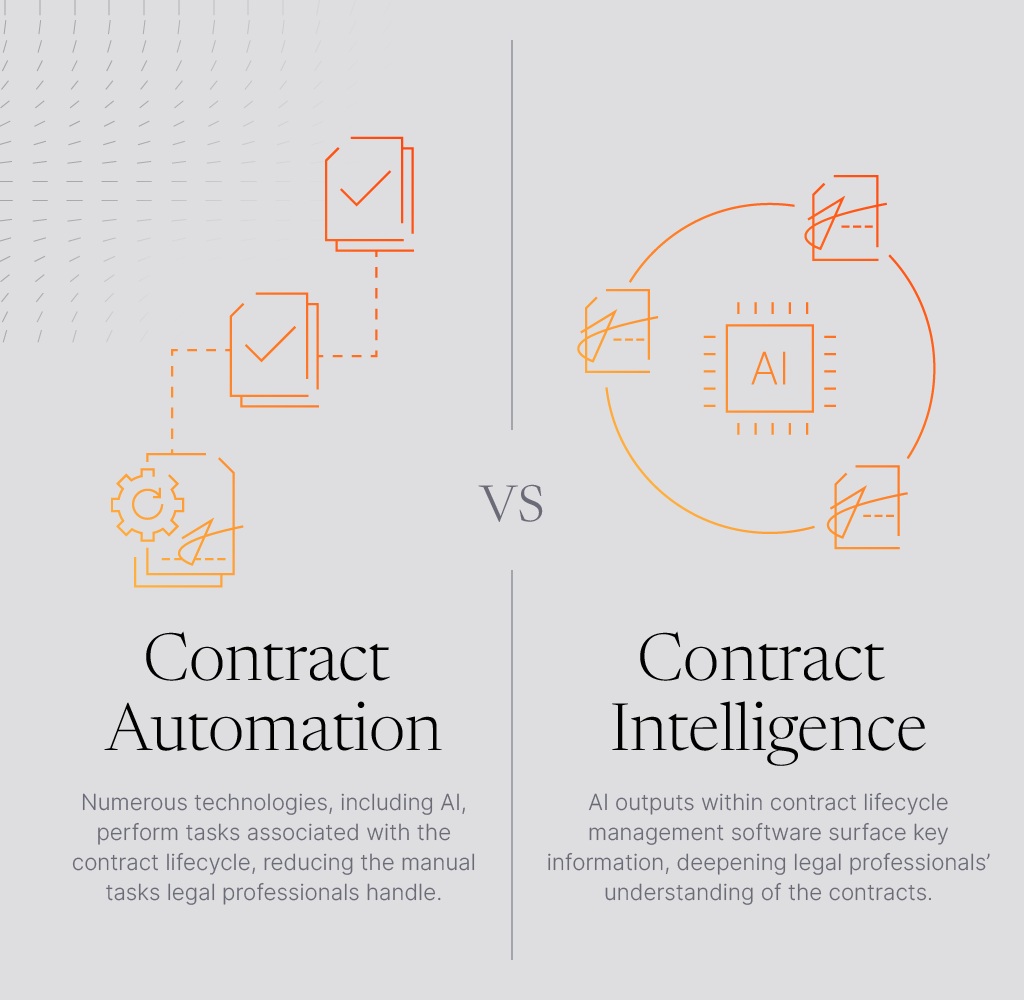Contract intelligence is a difficult concept to pin down. Part of the blame rests with artificial intelligence becoming a marketing buzzword. AI is everywhere these days. But underneath marketing and sales materials is the truth of what businesses can and can’t do with machine learning and AI.
AI has a long way to go before it can manage complex legal tasks for the private markets without supervision. The good news is that contract intelligence has already come a long way in the past decade and can accelerate negotiations, promote consistency across contracts, and provide visibility into obligations across funds.
This article explores how contract intelligence differs from automation and how contract intelligence features can benefit private fund managers.
Contract automation vs. contract intelligence
While contract automation and contract intelligence go hand in hand, there are key differences.
Contract automation
Contract automation uses numerous technologies, including AI, to perform tasks associated with negotiating, executing, and managing contracts, which humans typically handle. Contract automation ultimately reduces the number of manual tasks legal professionals complete during the contract lifecycle.
Contract intelligence
Contract intelligence is the integration of useful AI outputs within contract lifecycle management software. Contract intelligence surfaces relevant data points and trends, providing legal professionals with information they otherwise wouldn’t have and deepening their understanding of the contracts.

What can contract intelligence do?
Ontra Synapse is the proprietary AI underpinning Ontra’s contract automation and intelligence solutions. It enables several features that help lawyers working for our private markets customers negotiate routine contracts quickly.
Document analysis
A contract intelligence solution can assess the complexity of a legal document and provide the legal team with necessary information for negotiations. For example, an AI-based solution can identify time-sensitive provisions and other clauses that might complicate negotiations. In either case, the solution notifies the legal team, which can take appropriate action, such as prioritizing time-sensitive workflows or carefully reviewing the flagged language.
Precedent retrieval
A contract intelligence solution can identify and surface relevant precedent. By reviewing previous terms within similar contracts, lawyers can expedite negotiations and improve the consistency of language across the firm’s contracts.
Search
AI-enabled search improves the speed and accuracy of results. A contract intelligence platform can quickly identify, rank, and group similar language across a firm’s contracts and related documents.
Summarization
A contract intelligence solution can aggregate and summarize the key business and legal terms in one agreement or a group of contracts. With structured data and robust reporting capabilities, firms can easily view what they’ve agreed to, compare terms within a group of contracts, and identify trends in market terms over time.
Contract analytics
A contract intelligence platform includes AI-driven document processing, which entails converting documents into a digital format that allows businesses to gather and analyze structured data. Firms can track contract terms, including the parties, duration, and specific provisions, enabling them to identify trends and market terms. Firms can use these contract analysis capabilities to negotiate from a position of strength and accelerate negotiations.
What are the benefits of contract intelligence?
Benefits of contract intelligence can include:
- Greater visibility into previously executed contracts
- More consistent contract language
- Fewer rounds of negotiations
- A faster contract cycle time
- Improved risk mitigation
- Stronger relationships with investors and other parties
- Faster deal speed
- More proactive and efficient obligation tracking
- An automatic and comprehensive audit trail
- Reduced reliance and spend on outside counsel
What will contract intelligence do in the future?
Right now, contract automation and contract intelligence features work best for high-volume, routine agreements. In the future, however, AI will understand more nuanced contract language and make suggestions in more complex situations. It will eventually help veteran lawyers negotiate bespoke agreements faster and comply with and enforce their contracts.
AI capabilities are advancing considerably due to large language models, which are a type of deep learning neural network that can perform natural language processing tasks. Natural language processing is a field of machine learning in which machines can understand and generate human language. Thanks to large language models, machine learning and AI models can learn from vast amounts of data. Ultimately, the more industry-specific contracts and other documents a vendor uses to train its models, the more accurate the AI outputs will be and the more complex tasks the AI models will complete.
Contract intelligence FAQs
1. What is artificial intelligence?
AI is a broad field within computer science that’s focused on the creation of machines capable of performing complex tasks that typically require human intelligence.
2. What is machine learning?
Machine learning uses algorithms and statistical models to analyze and learn from patterns in data without human input.
3. What is natural language processing?
Natural language processing is a field of machine learning in which machines can understand language as people speak and write it, which enables machines to recognize, understand, translate, and generate text.
4. What is contract automation?
Contract automation uses numerous technologies to perform tasks associated with negotiating, executing, and managing contracts, which humans typically handle.
5. What is contract intelligence?
Contract intelligence is the integration of AI outputs within contract lifecycle management software.
6. How does a contract intelligence solution read contracts?
Natural language processing parses the contracts and related documents and learns language patterns indicative of specific clauses. The effect is that the NLP model learns the meaning of clauses within the contracts.
7. How are AI-based contract intelligence platforms trained?
The solution provider or another organization feeds examples of contracts into a machine learning model and, over time, the model learns the clause language and meaning. Solutions are trained on thousands of documents. Typically, the more training documents, the better. However, the quality of the documents and their relevance to the industry matter, too.
8. What are the benefits of contract intelligence?
The myriad benefits of contract automation and intelligence include faster contract execution workflows, decreased turnaround times, accelerated dealmaking, and faster extraction of business insights from structured contract data.
9. What kind of documents can contract intelligence handle?
In theory, contract intelligence solutions can handle any contract type with the proper training. The more rote and standardized the contract, the easier it is to train a machine learning model.
10. Can a contract intelligence platform write agreements without a lawyer?
Generally speaking, contract automation and intelligence applications aren’t generating agreements without a lawyer’s oversight. Instead, these technologies drastically speed up and improve lawyers’ workflows, making contract drafting and negotiations easier and freeing up lawyers’ time to focus on mission-critical work.



